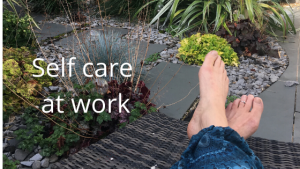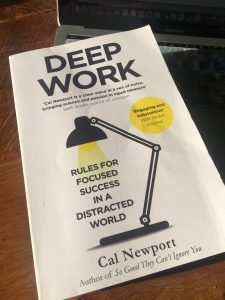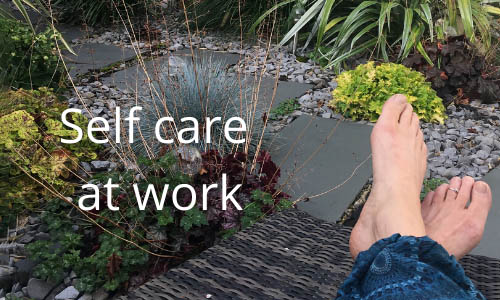Self care at work may seem like an alien concept in a world which values busyness. It is however, a necessary part of our collective transformation and contribution to healing our planet.
Tired all the time
Recent conversations with some friends revealed how they feel tired all the time. They put it down to work. Although I know they do work hard, something about that connection didn’t sit right with me.
I thought about my Papa who worked as a cooper in a brewery. Although not directly comparable, his work pattern might be. He had whistle blown breaks where everyone downed tools. This used to be the norm. My friends do not stop, they rarely take breaks and often work far more hours than they are contracted to do.
Burned out
I know how easy this is to do. I once headed up the non-clinical departments of an AIDS Hospice. It was a big, busy and all consuming job. Self care at work was rare. We hardly took breaks in the day and lunchtime was in the hospice canteen with work colleagues, patients and their families, not what you’d call restful. I lived, breathed and filled my whole life with work.
Eventually I burned out. I had to resign and spent the next 8 months resting and recuperating before I could face work again.

Doing it differently
Then I did it differently. I worked part time and I still left my desk at lunch time. It wasn’t easy, I felt guilty, and had to run the gauntlet of jibes and taunts made by those invisibly tied to their desks. I however, came back from a walk in nature or swim in the local pool, feeling refreshed and re-energised, they were not.
Before writing this article I thought I’d better check in with myself now. Although I don’t work in a conventional way I had, nonetheless, slipped into poor patterns. As a chronic over-doer my life easily becomes one big round of busyness. A looming sense of overwhelm and a nagging dissatisfaction often walked beside me as I filled my days with shoulds and have tos’.
Deep work
Helpfully I had just finished reading a book called Deep Work by Cal Newport. He makes a brilliant case for a more planned and focused approach, especially for our important work in the world. It’s easy to get distracted and spend time on lower value, shallow activities which whilst necessary, distract us from the more meaningful and profound contributions we could be making.
He doesn’t specifically talk about the importance of breaks however he does write a whole book about the value of this deep work and how to get it done. For me breaks are vital to this. This abandoned act of self care at work is essential and yet so hard to implement.

Juggle these demands
Most of us can’t head off to a cabin in the woods, we have multiple different task calling for our attention and need to juggle these demands. Therefore breaks are essential.
They define segments of our day with their subtle message of ending and beginning. This delineation of time supports a more disciplined and productive approach balanced by rest, reflection and recuperation. We become more effective and efficient.
Rhythms of nature
We are creatures of a planet where this balanced approach is mirrored in the rhythms of nature. There are times to grow and times to rest, this yin and yang cycle repeats daily, seasonally, annually as we travel around the sun. To work without breaks is to go against our nature.
“It is not enough to be busy. So are the ants. The question is: What are we busy about?”
Henry David Thoreau
Life changing
Reading Cal’s book has been life changing for me. Part of my calling is to serve our world through creative endeavours, including writing. His ideas and suggestions have inspired me to change the way I use my time and so achieve more of this vital work.
I now split my mornings between research and writing. The space between is punctuated by a break. I make a hot drink (we used to call it elevenses) and move to a different part of the house, free from distractions. At lunch time I stop again. I eat something nourishing, get outside and if there is anyone around this is a time to chat.
My afternoons are about the have tos’. These mostly shallow tasks when left unchecked could seep across a whole day. Now, confined to the afternoon they “have” to get done in a limited time, which helps focus my mind more on what needs achieved. It is also easier to avoid the distractions inconsequential nonsense (yes I mean social media, low priority emails and web surfing).
Meaningful work
I no longer moan. I am getting my meaningful work done, this is rewarding and enriches my life. Because I allot times and use breaks I have clarity about what is happening when and I am more focused about how I use each time slot.
Ok, so I’m not perfect, things go awry, deadlines need met, unplanned happenings intrude. But, the general structure has really helped me be live my life more on purpose rather than by default.
Satisfaction and pride
My suggestions is, stop and take breaks. Use them to create structure and clear boundaries about your most precious work in the world. Your tiredness will improve, you will achieve more, focus better, eliminate the unnecessary and be able to look back on your day with satisfaction and pride.
“Almost everything will work again if you unplug it for a few minutes, including you.”
Anne Lamott




I agree, breaks are good, especially if people are sitting down at desks. That book sounds really interesting, noted. I find that I get wonderful work done very early before anyone is up, that suits me. Then the day time is more relaxed. I’m trying to spend one hour a day outside on my three work days, and more on my house and home days. Breaks are essential, I slow down too much after a couple of hours at my desk!
Glad to have cleared my inbox after being away. I had to be ruthless and delete loads of emails, things I’d like to have read but can’t… and now back to being able too!
Sounds like you already know a lot of this stuff Sean, excellent. The book s a great read and very helpful for focusing the mnd on what is truly important.